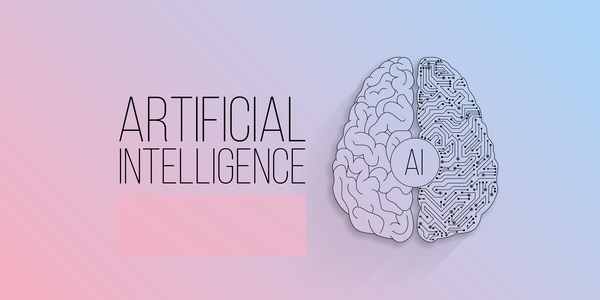The banking arena is not unfamiliar with terms such as Artificial Intelligence (AI), Machine Learning (ML), Robotic Process Automation (RPA), Data Analysis, and the like. Over the years, the banking and finance sector has been at the forefront to welcome technology for a complete workflow overhaul to optimize operations. The immense possibilities that AI offers for redesigning banking processes at every touchpoint have made the technology a cornerstone of the transformation of financial institutions.
For the banking industry, artificial intelligence isn’t limited to enhancing the front-end, middle office, and back-end operations; the impact extends well beyond those. Besides addressing the daily operational challenges, the cognitive technology gathers and analyses market data, draws revealing insights, adjusts its working patterns, and assists the human workforce in better decision-making.
Its role in predicting trends and insights for adjusting the organization’s roadmap according to the dynamics of the market underscores the impact of artificial intelligence in the finance sector.
Why do Banks Need Artificial Intelligence?
Operating in a technology-driven world that’s characterized by frequent digital disruptions, businesses can’t shy away from investing in ground-breaking technology to reimagine their customer-centric approach. Most financial institutions are operating understaffed and are under tremendous pressure to perform. The management loses precious time in firefighting and the long-term goals get shifted.
Reinforcement with additional manpower only adds to the overheads without significant improvement in the outcomes. While some businesses might still be on the fence when it comes to technology, AI is a no-brainer for financial institutions due to the following advantages.
Customer Service – Serving the tech-savvy customer with heightened expectations is simply not possible with the bank’s limited human resources. AI helps analyze case history and draw meaningful insights for refining the entire customer service workflow. Auto-case triaging, AI-based virtual chatbots, intelligent case segregation, and omnichannel customer service have enabled businesses to raise the bar.
AI has empowered banks to offer personalized service experience to customers to promote engagement. With cognitive capabilities, the virtual chatbots identify the case context and customer emotions in the text chat and offer humane responses for quick and satisfactory resolutions.
Humanoid chatbot interfaces can increase efficiency and reduce the cost for customer interactions.
Threats and Competition – The gnawing rivalries and the emergence of new competitors have forced the old players to rethink their operations to inject efficiency, drop costs, and anticipate the moves of rivals. For preventing cyber fraud, AI-security systems analyze global financial fraud, identify patterns, and help design and implement a watertight security ecosystem without impacting user experience.
Features like restricted and biometric access, advanced data analytics, data encryption, and natural language processing (NLP) abilities help beef up the security system.
Suspicious transactions and online phishing attempts can be blocked and sources can even be tracked down to prevent and predict security breaches.
Expansion – Increasing operational footprint is the only way to the survival of financial services. AI analyses growth opportunities, mitigates risks, and equips decision-makers with accurate data. With cost-efficient digital solutions handling daily operations and assisting in strategizing the growth roadmap, it’s easy to aim for higher avenues. Artificial intelligence is the perfect answer to the siloed legacy systems that tend to slow down operations and cause the efficiency to plummet.
Better customer relationship management, risk mitigation, opportunity nurturing, and market forecasts combine to form a solid growth platform for the organization.
Efficient Process-driven Services – The way to unhindered cross-departmental collaboration, constant improvement and refinement of workflows, process automation, and robust resistance to cyber threats goes through AI. All front, middle, and back-office operations including direct and basic tasks like account management, fund transfer, information verification can be carried out flawlessly by AI-based solutions.
Time-consuming documentation can be managed using technologies such as Optical Character Recognition (OCR) and insights can be generated for cutting down on back-office processing times.
Better offerings: AI enables banks to make sense out of the seemingly random customer behavior and feedback data, and harness them for designing financial offerings tailored to individual needs. Financial products and investment plans can be designed and analyzed based on industry requirements and market trends. This enables bankers to treat their loyal customers with a more personalized approach, without sacrificing their quality at any stage of the process.
Tailored financial offerings based on customers’ historical data, risk appetite, and spending behavior leads to increased business.
Reduced dependence on humans – While traditional Robotic Process Automation facilitates the replacement of tasks that are repetitive and don’t involve human decision-making, AI elevates the game to a higher level with the introduction of cognitive intelligence for better decision-making. Unlike humans, the decisions of AI-solutions are strictly objective and based on empirical data. With AI, strategic moves have become a more common and better result-yielding practice for banks.
From fewer procedural and protocol-related errors to the ones cropping from a high volume of customer interactions, features like Natural Language Processing and chatbots reduce errors.
Keeping costs low: High operational efficiency, accurate task automation, and lower turnaround times imply lower costs. It’s the attractive ROI figures of AI that persuade most businesses for a complete technology makeover. Experts predict that by the year 2023, banks would be saving a whopping $447 billion by the smart application of Artificial Intelligence capabilities. The cumulative effect of this is reflected in the annual revenue, soaring bottom-line, and plummeting overheads.
Intelligent chatbots, digital payment advisers, process automation, and fraud detection mechanisms result in improved customer experience and reduced operating costs.
Compliance: The banking sector has always been subjected to complex and resource-draining regulatory measures that keep changing or upgrading in regular intervals. AI-based solutions help banks to accurately identify the rules that apply to them and act aptly. The role of AI in regulatory compliance gets all the more important since this non-revenue driving process banking function, if not addressed timely, can cause grave legal consequences for the organization.
With AI, compliance officers can accurately identify regulatory rules and implement the changes. AI eliminates the need for manual search through digital documents and government websites.
How should Banking Businesses Prepare themselves for an AI Transformation?

Even with the obvious benefits of AI implementation elucidated, businesses might still be hesitant to take that first leap owing the lack of a clearly-defined project plan and preparation. The whole project might seem too technical and overwhelming for the management and resistance from the employees might also be a deterrent. Therefore, preparing for this positive change is the first stage of successful implementation of AI-based solutions.
Define the End Goals: The possibilities with AI are immense but an organization might not go for all of them and choose a few processes for the first phase of implementation. The management should decide whether they want to beef up their customer service, back-office operations, documentation verification, or a combination of tasks in the value-chain. Based on that, they should set measurable KPIs to gauge the success of the move. Another effective way of doing it is to carry out a cost vs benefit analysis by figuring out the pain points and the expected outcomes once the artificial intelligence solutions are successfully implemented.
In-house vs External Team: Cutting-edge stuff such as Artificial Intelligence demands proven expertise to help the user achieve the desired outcomes. Naturally, most banks and financial institutions do not have the required team of AI specialists and other resources to carry out the job flawlessly. Hence, seeking the services of an external AI consulting services provider is the best option for them. However, the management must be discreet and conduct extensive research to connect with the ideal AI outsourcing company with not just the capabilities but also a proven track-record of executing AI projects for other financial organizations.
A Foolproof Implementation Plan: Once the business ropes in an AI consulting company, they have to collaborate on creating a blueprint of the project. The groundwork must be laid by considering the client requirements, budget, and priorities. The goals must be time-bound and there should be the right tools and methodologies to monitor the progress. The vendor must agree to the client’s timeline, budget, and needs, and must introduce the client to purpose-built project management and BI tools to enable them to stay on top of the developments.
Funds and Change Management: The client must arrange for adequate project funds to ensure a smooth execution of the AI implementation plan. Avoiding high unforeseen costs during the course of the project is important, and accurate budgeting with inputs from the artificial intelligence consulting services provider helps to this end. Also, this would be a major change for most employees of the client and hence, steps must be taken to ensure a smooth transition. The management must arrange for adequate training sessions so that the stakeholders have a complete understanding of the change and can continue to be productive.
Why Outsource AI Service?

As described, AI is the cream of automation technology, but desirable ROI can only be assured when the project is handled by seasoned professionals. When a competent artificial intelligence development services provider assumes the responsibility for the end-to-end delivery of the project, the client can rest assured of getting that much needed competitive advantage.
Flawless Automation: Automation of banking processes such as compliance and regulation, cash management, service case management, and others, must be done with AI-enabled cognitive bots tailored to the client’s ecosystem. Such enhanced automation can only be delivered by an experienced technology firm with reputed clients in the banking industry. The complex nature of the work makes outsourcing artificial intelligence services the prudent way to harness the capabilities of the AI and ML.
Reduced Overheads: Outsourcing significantly reduces the client’s expenses owing to the vendor’s agility and resource-optimized processes. The vendor team would also train the client members on the ideal usage of the technology and help the client’s IT department with all support training. Another advantage with AI solutions is their ability to train themselves on the tasks through machine learning techniques, cutting down on the need for human intervention and therefore, the associated costs. An artificial intelligence consulting company can promote savings by reducing the client’s dependency on on-premises infrastructure and helping them shift to cloud-hosting.
Negotiable Terms: Banks operate in a dynamic environment where operations must be tweaked frequently as per the changing scenario of the industry and customer needs. This underscores their need for a service contract with negotiable terms that gives them cost benefits even in the long run. Most AI vendors serving banking clients offer flexible contract terms that creates a win-win equation for both sides. While negotiating, the two parties must decide on the ownership of the solutions built and their long-term maintenance.
Enhanced Security: Cyber security frauds give sleepless nights to bankers and it’s the grave implications of data security breaches that lead them to seek external assistance. A vendor with the experience of working in the finance sector would be aware of the common security threats to banks and would offer AI-solutions for securing user accounts, funds, and banking operations.
A competent AI solutions vendor can integrate AI technology into the existing security system of the bank and enable the technology to predict and identify security breaches and block all unauthorized attempts for carrying out transactions.
Given the trying times in the finance sector and the unpredictability the future holds, working smart is the only way forward for banks other financial organizations. Also, it’s high time the management and decision-makers heading such businesses realized that the simple and siloed computing systems and the basic robots that used to take up just the repetitive functions, don’t fit the scene any longer. Today, the need is for smart and intelligent solutions that can learn from the data they process and implement the changes to the workflows without human invention.
Given the giant leaps that technology is taking with AI services, Machine Learning, Big Data, etc., banking institutions must act immediately to ensure that they do not miss the bus to offer greater value and more personalized experiences to customers. This would enable them to realize higher efficiency, reduced risks, lower costs, and better growth prospects.
Who We Are and What Makes Us an Industry Authority?
This article is brought to you by getSmartcoders, an enterprise-grade artificial intelligence company with over 8 years of experience in developing AI solutions. Having developed numerous solutions for different industry verticals, our experts understand how to leverage this evolving technology to meet the specific needs of companies. Our experts have hands-on experience with machine learning, conversational technologies, chatbots, deep learning, etc.



